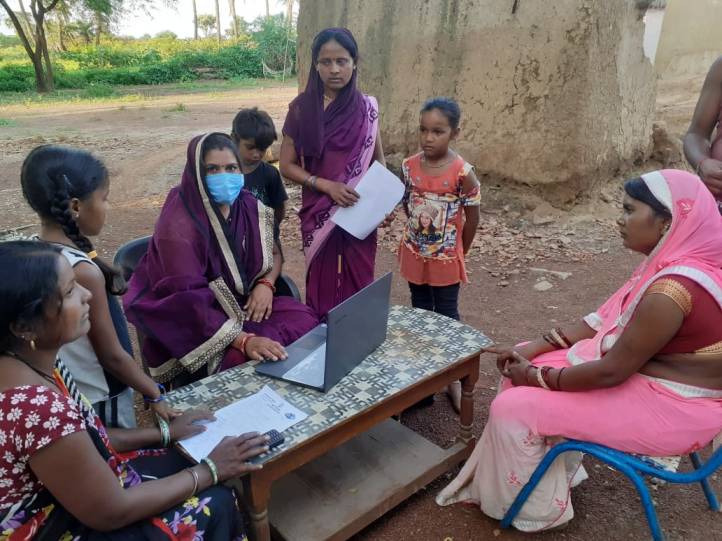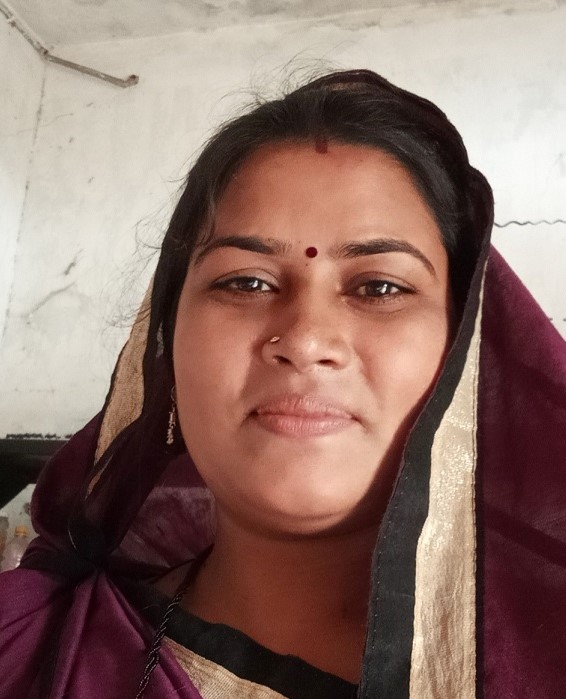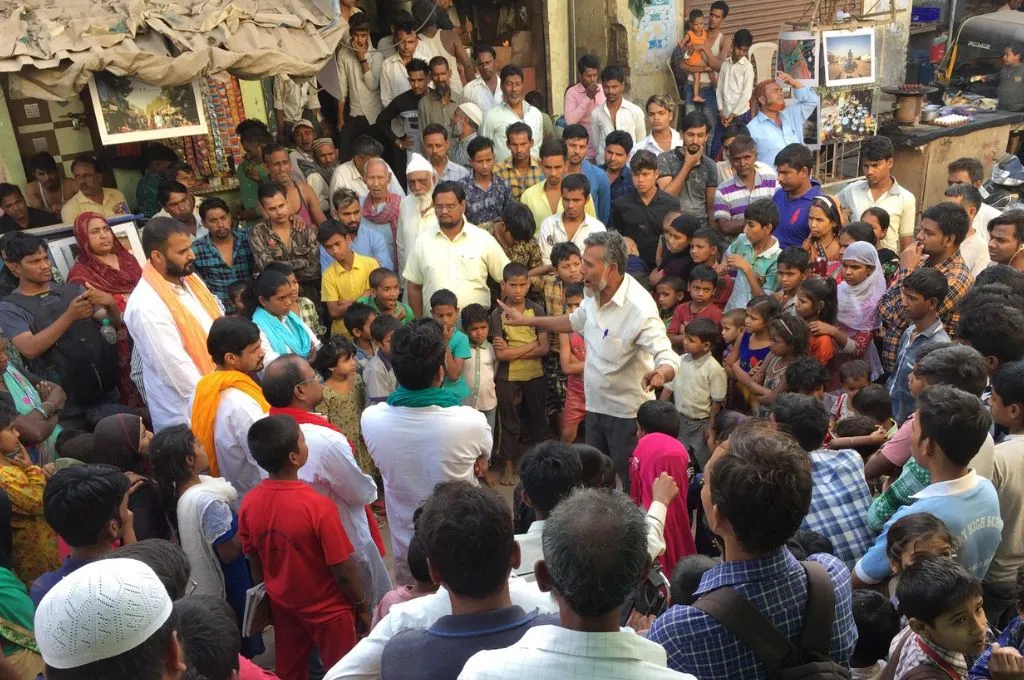My name is Kiran Mandle, and I am from a village called Farhada, located in Chhattisgarh’s Raipur district. I work for Haqdarshak, a technology platform that connects citizens to government schemes they are eligible for. I charge a nominal fee from citizens for my work, which has become a source of revenue for me, bringing in around INR 4,000 a month.
There are about 200 schemes in Chhattisgarh that I help people access. Most often, people don’t even know about these schemes or whether they are eligible for them. My work includes running my village’s Common Service Centre (CSC), going door-to-door to build awareness about various government schemes, and helping people with the paperwork to avail of these schemes. I’ve been working as a Haqdarshika since January. Prior to that, I was engaged with the samuuh (self-help group) in my community. I also used to help my husband with agricultural work on our two-acre plot of land. I still do that, along with taking care of our two children and managing our household.
The biggest challenge I’ve faced is changing people’s perceptions around the work I do.
As a Haqdarshika, I sometimes have to travel to nearby villages such as Budhgahan or Ilda (villages where we don’t have a presence) and hold awareness-building sessions with villagers there. I’ve found that when I have to work in new villages, approaching the women’s samuuh is a good starting point. I speak to them first, explain how I can help, and assure them that my intentions are good. The people in our areas in Chhattisgarh have difficulty trusting people who say they will help them with government-related work. In the past, we’ve had outsiders claiming they’re from the government offer to help us with paperwork for procedures such as obtaining a PAN card. They then took our money and vanished—never to return.
As a result, the biggest challenge I’ve faced is changing people’s perceptions around the work I do, but over time, I’ve been able to help enough people. Now, villagers approach me themselves, for help with various schemes.
5.30 AM: I wake up early, do my housework, and get my kids ready for school (though they are attending online classes for now). I also have to cook breakfast for them, my husband, and my niece who lives with us. I usually leave for work around 10 AM, once I have finished all my housework and any work I have to do on my farmland. Some mornings, before heading to the CSC, I have to go door-to-door to conduct surveys in the village about specific schemes, to find out how many people know about them, so I can then spread information about the scheme’s details.
10 AM: I have a morning meeting with a samuuh in my village today, and set out from home on foot. The samuuh’s didis (sisters) know me, and I don’t need to introduce myself or my work to them. They’re quite interested in learning about their entitlements, and are usually proactive about filling up forms, opening accounts, and doing whatever else they need to in order to avail of the schemes.
I spend some time telling them about the Pradhan Mantri Shram Yogi Maandhan Yojana, a government scheme launched for old age protection and social security. It’s a good support mechanism for the elderly. The scheme aims to give an assured monthly pension of INR 3,000 per month to workers in the unorganised sector, after 60 years of age. It’s a voluntary scheme on a 50:50 basis, where contributions by account holders are matched by the Central government.
So, whatever money we deposit into our accounts now will help us when we grow old. There are many cases in villages here where sons get married and bring their wives home, after which mothers are made to stay outside, alone. To avoid situations like that, we can take advantage of schemes like this.

I help people with getting PAN cards made, applying for Aadhaar cards, documenting birth certificates, as well as signing up for various schemes.| Picture courtesy: Haqdarshak
11 AM: I head towards my second morning meeting—this time with the village sarpanch (head of the village). He is familiar with my work and tries to support it. Every now and then, we meet to discuss new schemes that we can bring to the villagers’ attention. Some time ago, he saw that I was going door-to-door to try and talk to people about different schemes, but most people were busy tending to their fields. He then invited me to the next panchayat meeting, to talk to everyone at once, when everyone is present. He also helps convince people that these schemes can really help them—we work together.
About 50-60 Sukanya accounts have been opened since January.
At one of these panchayat meetings, I was talking about the Sukanya Samriddhi Yojana (SSY). This is an Indian government-run scheme which targets parents of girl children, encouraging them to save funds for their daughters’ future education and marriage expenses. A young girl’s grandparents approached me, asking me to help them open a Sukanya account for her. I found out that she was an orphan, so I helped them free of charge. Usually, I work on a fee-based model. Each scheme has a unique service fee, calculated based on time and effort that goes into the application.
The sarpanch and I discuss the success of the Sukanya scheme. It’s been exceptionally popular in our village. About 50-60 Sukanya accounts have been opened since January. In comparison, the Pradhan Mantri Shram Yogi Maandhan Yojana has not had much uptake. Most villagers aren’t aware about it and don’t realise the benefits.
12 PM: Once my meeting wraps up, I walk back home to cook lunch for the family. I also try to spend some time in the afternoon to help my children with their studies. My son wants to become a doctor, and my daughter an engineer. I used to dream of becoming a teacher, but now, I want to try my hardest to help them achieve their dreams.
2 PM: I usually go to the CSC in the afternoons after finishing up at home. I run the centre, and I help people with a variety of different things: Getting PAN cards made, applying for Aadhaar cards, documenting birth certificates, as well as signing up for various schemes. A lot of these processes are computerised, but involve filling physical forms in manually and then scanning them. Although now, for a lot of schemes, we can also just fill online forms. I did a basic computer skills course after my 12th standard graduation, and I also received training from Haqdarshak once I started working with them.
While I can do most things online myself, for some schemes, I need help from the tehsil (block) office.
While I can do most things online myself, for schemes like the Shram Yogi Maandhan Yojana, I need help from the tehsil (block) office for the application. The application process for most schemes usually takes about a month to complete, but there have been delays lately due to COVID-19. With the Sukanya scheme, for example, getting a passbook can become problematic. Going to groups of people now is also difficult, and only when there are a small number of didis assembled at a samuuh meeting, can I inform them about schemes.
4 PM: I have to visit a couple of people’s houses before I start winding my day down. I can still meet people, but have to maintaining physical distance when talking to them. When I go door to door, I prefer to talk to didis, rather than bhaiyas (men). Men often comment on the work I do, questioning where I am going and what I am doing. But now that I’ve made progress and I know I am helping people, I don’t pay attention to these things. Men constantly talk about women, but my husband supports my work. When I have to travel to neighbouring villages, he drops me off on his two-wheeler and even accompanies me sometimes, helping me with my job.
But a big challenge, that I face with men and women alike, is building trust. After the incidents where outsiders scammed us and ran away with our money, gaining back trust took a long time. Those incidents have happened about 3-4 times in my village and its surrounding areas. Now, people are naturally cautious, particularly when it comes to government-related paperwork. I try to convince them that I am well-intentioned, and that every person isn’t the same. When things get difficult, I discuss what can be done with my coordinator at Haqdarshak, and sometimes my husband also provides me assistance and advice.
5 PM: I’m trying to finish off the last of my work early so I can get home soon, considering my day starts so early every day. Since I began my work as a Haqdarshika, I have worked on about 600 cases. People are more aware of their entitlements now. When I was working with the samuuh, even I wasn’t aware of many schemes. It was actually the didis from my samuuh who introduced me to the other Haqdarshika working in our area. The samuuh didis said that since our village itself did not have anyone who was working on awareness and accessing government schemes, I could take it up.
So, although I could not realise my dream of being a teacher, I still get to help people learn!
As told to IDR.
—
Know more
- Read about how empowering women with digital innovations can help growth and inclusivity.
- Watch Kanti Pal, a Haqdarshika from Madhya Pradesh talk about her experiences with helping citizens access entitlements.
- Read about the challenges of bridging the last-mile connectivity gap and how social businesses can help.





